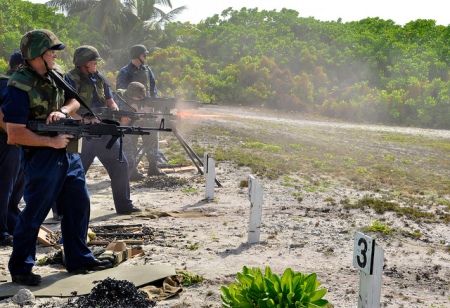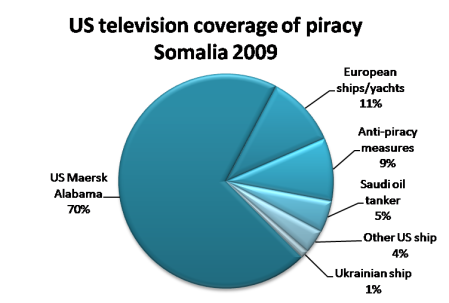Live-fire training exercises by US sailors, Diego Garcia. Photo by Michael Thompson (US Pacific Fleet) under a CC Licence
The modern history of the Chagos islands is a thoroughly shameful one. This small archipelago, situated in the middle of the Indian Ocean, was originally part of what was then the self-governing British colony of Mauritius. Mauritius was convinced to sell these islands to the UK in 1965 under dubious circumstances: the sale was part of the independence negotiations (independence was achieved in 1968) and the prime minister of Mauritius who negotiated the deal was awarded a knighthood soon after the transfer.
The UK subsequently leased the largest island of the archipelago, Diego Garcia, to the US (who wanted it for a military base) in exchange for a discount on Polaris nuclear missiles. In preparation for the construction of the military base, the UK then proceeded to ethnically cleanse the islands, forcibly removing the entire population and dropping them off unceremoniously in the Seychelles and what was left of Mauritius.
Diego Garcia became an important base for the US, particularly so in the 2000s, when it served as a hub from which long-range bombers attacked Afghanistan and Iraq. The base has been used by the CIA for so-called ‘extraordinary rendition’ flights, and may also have served as a CIA black site prison. In 2010, the UK established a ‘marine protected area’ (the world’s largest) around the archipelago. According to US diplomatic cables made public courtesy of WikiLeaks, this move was specifically designed to prevent former residents from returning (survival for the inhabitants would be difficult if they were prevented from fishing). For the UK, this clever ‘solution’ looked good from any angle: not only would the possibility of return be taken off the table, but US military activities could continue, and ‘points’ for environmental concern could also be scored.
Isolated and unpopulated (or conveniently depopulated) islands are, of course, the ideal springboards from which to project military power in this day and age. There are none of the hassles associated with holding or running a colony, for example, and not only do they make sense in pure military terms (especially if one has long-range bombers), but they also preclude witness or interference by any pesky civilians, journalists or human rights organizations. In the case of populated islands, the consent of inhabitants can, to a degree, be bought, but opposition can still be politically and financially costly, as the US and its generally willing collaborator (the Japanese government) have found, for example, in the use of Okinawa for military bases.
The lease of the Chagos islands to the US expires in 2016, and any possible extension has to be agreed on by December 2014 (the lease allows for a 20-year extension). Crucially, the original terms of purchase of the Chagos islands allow for their return to Mauritius when they are no longer needed for defence purposes. If there is a time for negotiating a return of the islands to Mauritius, it is now. Indeed, the prime ministers of the UK and Mauritius are set to meet next week, and the issue of the Chagos islands is on the agenda.
Mauritius has expressed its intention to have the islands returned, but interestingly, has also made it clear that it does not intend to challenge the continuation of US military activities there. Clearly, allowing the base to remain in Diego Garcia would serve as a considerable financial incentive for the government of Mauritius. But how receptive will the UK be to a call by Mauritius for the return of the islands? Will their response reveal anything about possible plans in the West to bomb Iran? Diego Garcia would undoubtedly serve as one of the key military hubs in the case of any such catastrophe.
There are other deals in play. Mauritius has recently agreed to offer its territory and services for the prosecution and imprisoning of Somali pirates. Was this designed to improve their bargaining position for the return of the Chagos islands? To what degree will any such deals benefit the people of Mauritius and the former (forcibly evicted) inhabitants who wish to return to the Chagos islands (as opposed to a few people holding political power at the top)? Will the end result of all of this simply be a continuation of the same old systems under new management? This is a good time for some hard-hitting media scrutiny on this issue – in the UK, US and Mauritius.


